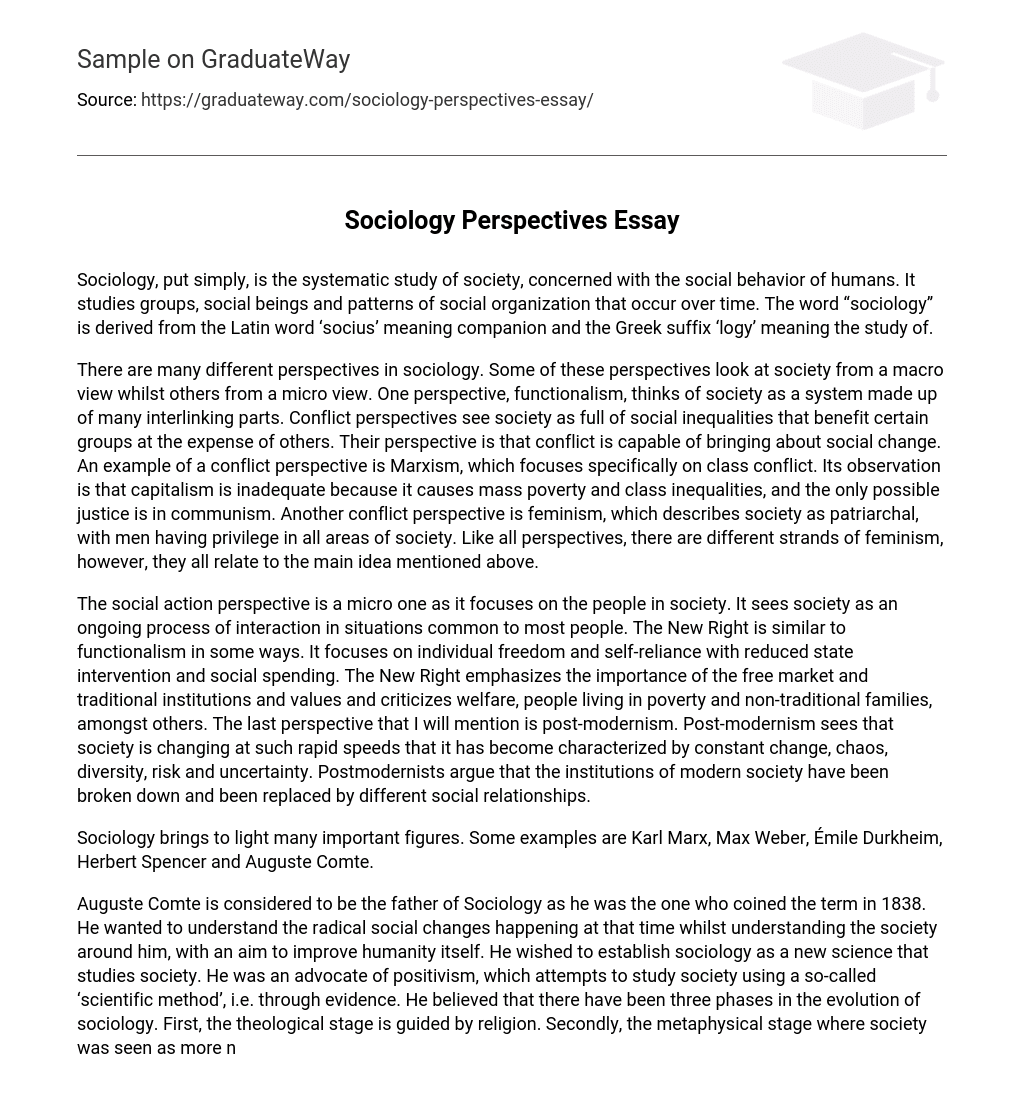Sociology, put simply, is the systematic study of society, concerned with the social behavior of humans. It studies groups, social beings and patterns of social organization that occur over time. The word “sociology” is derived from the Latin word ‘socius’ meaning companion and the Greek suffix ‘logy’ meaning the study of.
There are many different perspectives in sociology. Some of these perspectives look at society from a macro view whilst others from a micro view. One perspective, functionalism, thinks of society as a system made up of many interlinking parts. Conflict perspectives see society as full of social inequalities that benefit certain groups at the expense of others. Their perspective is that conflict is capable of bringing about social change. An example of a conflict perspective is Marxism, which focuses specifically on class conflict. Its observation is that capitalism is inadequate because it causes mass poverty and class inequalities, and the only possible justice is in communism. Another conflict perspective is feminism, which describes society as patriarchal, with men having privilege in all areas of society. Like all perspectives, there are different strands of feminism, however, they all relate to the main idea mentioned above.
The social action perspective is a micro one as it focuses on the people in society. It sees society as an ongoing process of interaction in situations common to most people. The New Right is similar to functionalism in some ways. It focuses on individual freedom and self-reliance with reduced state intervention and social spending. The New Right emphasizes the importance of the free market and traditional institutions and values and criticizes welfare, people living in poverty and non-traditional families, amongst others. The last perspective that I will mention is post-modernism. Post-modernism sees that society is changing at such rapid speeds that it has become characterized by constant change, chaos, diversity, risk and uncertainty. Postmodernists argue that the institutions of modern society have been broken down and been replaced by different social relationships.
Sociology brings to light many important figures. Some examples are Karl Marx, Max Weber, Émile Durkheim, Herbert Spencer and Auguste Comte.
Auguste Comte is considered to be the father of Sociology as he was the one who coined the term in 1838. He wanted to understand the radical social changes happening at that time whilst understanding the society around him, with an aim to improve humanity itself. He wished to establish sociology as a new science that studies society. He was an advocate of positivism, which attempts to study society using a so-called ‘scientific method’, i.e. through evidence. He believed that there have been three phases in the evolution of sociology. First, the theological stage is guided by religion. Secondly, the metaphysical stage where society was seen as more natural over the supernatural of the past. Lastly, the scientific/positive stage where society was understood through scientific methods.
Karl Marx was a German conflict theorist who saw conflict between social classes, with the majority of people working long hours in factories whilst the power and profits belonged to aristocrats and capitalists. He saw a need for radical change and therefore founded Communism, inspiring Marxism in the process.
Max Weber studied social action and the structure of society. Opposite to Comte, he was anti-positivist. Weber believed that economic factors brought about social change, however, he also saw values and ideas as important factors in bringing about social change. He saw modern society as being characterized by Bureaucracy and called it rationalization. Rationalization means the organization of social life in accordance with technical knowledge and efficiency.
Émile Durkheim was a French functionalist who saw the need to “study social facts as things”. He wanted to express that social institution have a type of reality that allows them to be studied as if they were natural objects. To Durkheim, a so-called “social fact” is something that is usually taken for granted as something that cannot be changed. The monetary system is a good example of this, as it outlives us, but we are forced to use it to take part in society. Therefore, it shapes our way of life and our choices whilst existing independently of us as individuals, which is the definition of a social fact. He explained the unsettling, rapid social change as anomie, and asked whether it was possible for individuals to become used to such a system.
In conclusion, sociology can and has been, seen from many different perspectives created by many people throughout history. However, in the ever-changing world around us, one thing remains the same sociology is an important study of society that proves beneficial in countless aspects in all ways of life.





